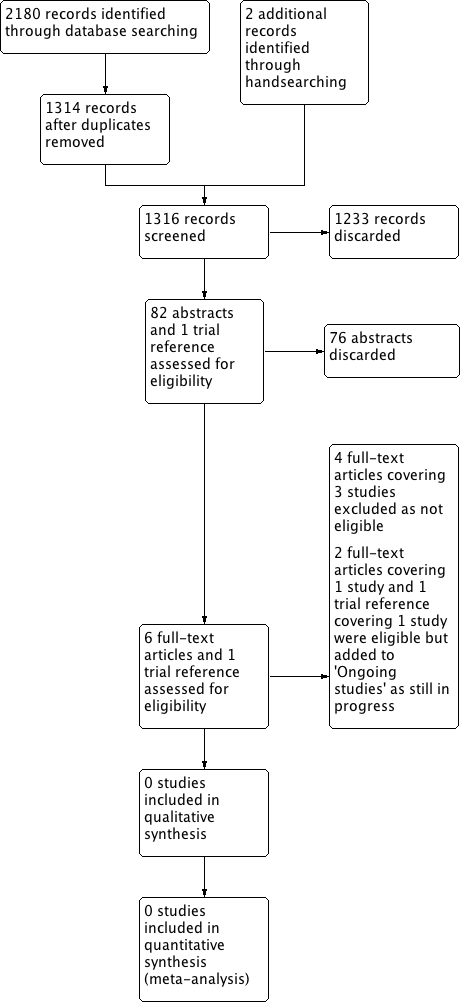Contenido relacionado
Revisiones y protocolos relacionados
James Howard, Raghav C Dwivedi, Liam Masterson, Prasad Kothari, Harry Quon, F. Christopher Holsinger | 14 diciembre 2018
Laura Warner, Jessal Chudasama, Charles G Kelly, Sean Loughran, Kenneth McKenzie, Richard Wight, Paola Dey | 12 diciembre 2014
Liam Masterson, Daniel Moualed, Ajmal Masood, Raghav C Dwivedi, Richard Benson, Jane C Sterling, Kirsty M Rhodes, Holger Sudhoff, Piyush Jani, Peter Goon | 15 febrero 2014
Astrid Baalbergen, Yerney Veenstra, Lukas Stalpers | 31 enero 2013
Sarah Burdett, Jean Pierre Pignon, Jayne Tierney, Helene Tribodet, Lesley Stewart, Cecile Le Pechoux, Anne Aupérin, Thierry Le Chevalier, Richard J Stephens, Rodrigo Arriagada, Julian PT Higgins, David H Johnson, Jan Van Meerbeeck, Mahesh KB Parmar, Robert L Souhami, Bengt Bergman, Jean‐Yves Douillard, Ariane Dunant, Chiaki Endo, David Girling, Harubumi Kato, Steven M Keller, Hideki Kimura, Aija Knuuttila, Ken Kodama, Ritsuko Komaki, Mark G Kris, Thomas Lad, Tommaso Mineo, Steven Piantadosi, Rafael Rosell, Giorgio Scagliotti, Lesley K Seymour, Frances A Shepherd, Richard Sylvester, Hirohito Tada, Fumihiro Tanaka, Valter Torri, David Waller, Ying Liang, for the Non‐Small Cell Lung Cancer Collaborative Group | 2 marzo 2015
Bertrand Baujat, Jean Bourhis, Pierre Blanchard, Jens Overgaard, Kian K Ang, Michelle Saunders, Aurélie Le Maître, Jacques Bernier, Jean Claude Horiot, Emilie Maillard, Thomas F Pajak, Michael G Poulsen, Abderrahmane Bourredjem, Brian O'Sullivan, Werner Dobrowsky, Hliniak Andrzej, Krzystof Skladowski, John H Hay, Luiz HJ Pinto, Karen K Fu, Carlo Fallai, Richard Sylvester, Jean Pierre Pignon, MARCH Collaborative Group | 8 diciembre 2010
Alan PV Carvalho, Flávia MR Vital, Bernardo GO Soares | 18 abril 2012
Hayley Barnes, Katharine See, Stephen Barnett, Renée Manser | 21 abril 2017
Renée Manser, Gavin Wright, David Hart, Graham Byrnes, Don Campbell, Zoe Wainer, Sera Tort | 24 enero 2005
Sarah Burdett, Larysa Rydzewska, Jayne Tierney, David Fisher, Mahesh KB Parmar, Rodrigo Arriagada, Jean Pierre Pignon, Cecile Le Pechoux, on behalf of the PORT Meta‐analysis Trialists Group | 11 octubre 2016


